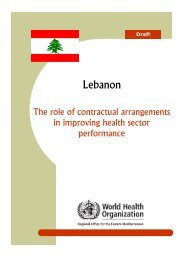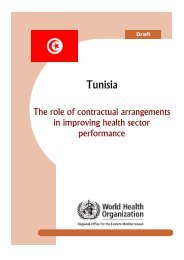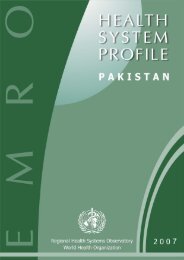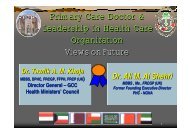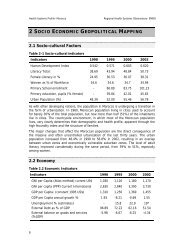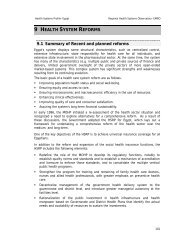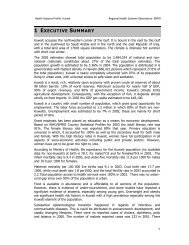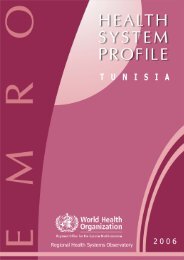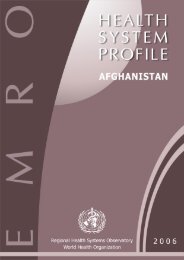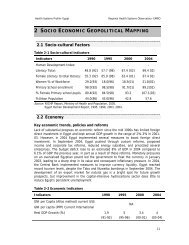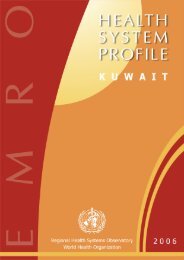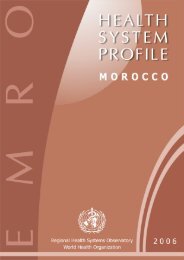The role of contractual arrangements in improving health sector ...
The role of contractual arrangements in improving health sector ...
The role of contractual arrangements in improving health sector ...
Create successful ePaper yourself
Turn your PDF publications into a flip-book with our unique Google optimized e-Paper software.
Islamic Republic <strong>of</strong> Iran<br />
OVERVIEW OF THE IRANIAN HEALTH SYSTEM<br />
<strong>The</strong> <strong>health</strong> system <strong>in</strong> the Islamic Republic <strong>of</strong> Iran is structured <strong>in</strong>to three levels.<br />
Specialty and super-specialty curative services are located and delivered at the upper level,<br />
ma<strong>in</strong>ly <strong>in</strong> mega cities and urban areas. <strong>The</strong> bottom two levels belong to primary <strong>health</strong> care<br />
services, and their activities cover rural, deprived, and remote areas’ populations as well as the<br />
urban poor.<br />
<strong>The</strong> <strong>health</strong> system is highly centralized, and almost all decisions regard<strong>in</strong>g general<br />
goals, policies and allocation <strong>of</strong> resources are made at the central level by the M<strong>in</strong>istry <strong>of</strong><br />
Health and Medical Education. <strong>The</strong> M<strong>in</strong>istry has the legal authority to oversee, license and<br />
regulate the activities <strong>of</strong> the private <strong>health</strong> <strong>sector</strong> (Mehriar et al, 2004).<br />
Primary <strong>health</strong> care services are basically delivered by the public <strong>sector</strong> and are almost<br />
free <strong>of</strong> charge, particularly for the poor. Upper-level services (specialty and super-specialty<br />
curative services), are the area <strong>in</strong> which private <strong>sector</strong> plays a dist<strong>in</strong>ctive <strong>role</strong>. <strong>The</strong>re are about<br />
123 well-equipped, urban-centred, private deliver<strong>in</strong>g specialty and super-specialty service<br />
hospitals <strong>in</strong> the Islamic Republic <strong>of</strong> Iran.<br />
Emergency, curative, diagnostic and pharmaceutical services are delivered by private<br />
hospital. Although there is a tariff schedule for <strong>health</strong> care services determ<strong>in</strong>ed by High<br />
Council <strong>of</strong> Medical Services Insurance (headed by the M<strong>in</strong>ister <strong>of</strong> Health and Medical<br />
Education), the private <strong>sector</strong> does not apply it consistently. Among these hospitals, almost all<br />
practise fee-for-service payment and charge their patients accord<strong>in</strong>g to their own fee<br />
schedules. Regulation and monitor<strong>in</strong>g <strong>of</strong> private <strong>sector</strong> performance are not as effective as<br />
expected. <strong>The</strong> well-known physicians and specialists <strong>of</strong> the public <strong>sector</strong> work <strong>in</strong> the private<br />
<strong>sector</strong> as well. Nurs<strong>in</strong>g and technical staff <strong>of</strong> private hospitals also come ma<strong>in</strong>ly from the<br />
public <strong>sector</strong>. <strong>The</strong>re is not a clear division between public and private <strong>sector</strong>s with regard to<br />
<strong>health</strong> care service delivery <strong>in</strong> the Islamic Republic <strong>of</strong> Iran, creat<strong>in</strong>g confusion <strong>in</strong> the area <strong>of</strong><br />
public–private partnership. <strong>The</strong> overlapp<strong>in</strong>g <strong>of</strong> human resource functions can affect quality <strong>of</strong><br />
care, effectiveness <strong>of</strong> regulations and management <strong>of</strong> services on the whole. <strong>The</strong> issue <strong>of</strong><br />
public <strong>sector</strong> resources exploitation by the private <strong>sector</strong> rema<strong>in</strong>s to be studied.<br />
<strong>The</strong> private <strong>sector</strong>, due partly to its <strong>in</strong>herent for-pr<strong>of</strong>it orientation and partly to poor<br />
organizational behaviour <strong>of</strong> public <strong>sector</strong>, does not participate actively <strong>in</strong> provid<strong>in</strong>g and<br />
deliver<strong>in</strong>g primary <strong>health</strong> care services. Private hospitals also do not show keenness to<br />
contract with the M<strong>in</strong>istry <strong>of</strong> Health and Medical Education, because <strong>of</strong> low tariffs, extra<br />
paperwork and delays <strong>in</strong> payment.<br />
Structurally, and apart from the private <strong>sector</strong>, there are other organizations and<br />
<strong>in</strong>stitutions which play a lead<strong>in</strong>g <strong>role</strong> <strong>in</strong> <strong>health</strong> care management <strong>of</strong> Islamic Republic <strong>of</strong> Iran,<br />
<strong>in</strong> terms <strong>of</strong> policy-mak<strong>in</strong>g, tariff-sett<strong>in</strong>g, and service provision and delivery. <strong>The</strong> Social<br />
Security Organization (SSO) and Armed Forces Health Services Insurance are examples.<br />
Moreover, charity organizations, which focus ma<strong>in</strong>ly on outpatient services, Imam Khome<strong>in</strong>i<br />
Relief Committee, which serves ma<strong>in</strong>ly the poor, and several units <strong>of</strong> <strong>health</strong> care delivery<br />
91



